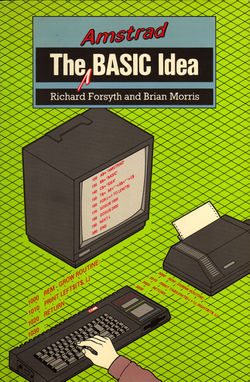Difference between revisions of "The BASIC Idea"
From CPCWiki - THE Amstrad CPC encyclopedia!
(→the basic idea) |
Cpcmaniaco (Talk | contribs) |
||
| (7 intermediate revisions by 2 users not shown) | |||
| Line 1: | Line 1: | ||
| − | [[Image: | + | [[Image:The Amstrad BASIC Idea (Chapman and Hall) Front Coverbook.jpg|right|thumb|250px|Frontpage]] |
| − | |||
| − | + | This book will help you to become a competent programmer in Amstrad BASIC. | |
| − | + | ||
| − | |||
| − | + | == Information == | |
| − | + | {|{{Prettytable|width: 700px; font-size: 2em;}} | |
| + | |||
| + | |Title:|| '''The Amstrad BASIC Idea''' | ||
| + | |- | ||
| + | |Authors:|| Richard Forsyth - Brian Morris | ||
| + | |- | ||
| + | |Publisher:|| [[Chapman & Hall / Methuen]] | ||
| + | |- | ||
| + | |Year:|| 1986 | ||
| + | |- | ||
| + | |Pages:|| 276 | ||
| + | |- | ||
| + | |ISBN:|| ISBN 0-412-28070-1 | ||
| + | |- | ||
| + | |} | ||
| + | |||
| + | == Covers == | ||
| + | |||
| + | <gallery caption="The Amstrad BASIC Idea"> | ||
| + | |||
| + | Image:The Amstrad BASIC Idea (Chapman and Hall) Back Coverbook.jpg|Back Cover | ||
| + | Image:The Amstrad BASIC Idea (Chapman and Hall) Left Coverbook.jpg|Left Cover | ||
| + | Image:The Amstrad BASIC Idea (Chapman and Hall) Front Coverbook.jpg|Front Cover | ||
| + | |||
| + | </gallery> | ||
== Contents == | == Contents == | ||
<pre> | <pre> | ||
| − | |||
| − | |||
| − | |||
| − | |||
| − | |||
| − | |||
| − | |||
| − | |||
| − | |||
| − | |||
| − | |||
| − | Appendices | + | Preface. |
| − | A ASCII codes | + | |
| − | B Basic keywords | + | 01 - Getting started: General introduction. |
| − | C CP/M commands | + | 02 - Basic Basic: Elementary programming. |
| − | D Disc-file instructions | + | 03 - Loops and lists: Iterative processing. |
| − | E Error messages | + | 04 - Subprograms: Modular programming. |
| − | F Pre-defined functions | + | 05 - Character stings: Non-numeric computing. |
| − | G Glossary of computing terms | + | 06 - Input/output: Communicating with the machine. |
| − | H Hints on further reading(Select bibliography) | + | 07 - Files: Elementary data processing. |
| + | 08 - Advanced topics: The plot thickens. | ||
| + | 09 - Software design: Structured programming guidelines. | ||
| + | 10 - Case study: Basic in action. | ||
| + | |||
| + | Appendices: | ||
| + | |||
| + | A - ASCII codes. | ||
| + | B - Basic keywords. | ||
| + | C - CP/M commands. | ||
| + | D - Disc-file instructions. | ||
| + | E - Error messages. | ||
| + | F - Pre-defined functions. | ||
| + | G - Glossary of computing terms. | ||
| + | H - Hints on further reading (Select bibliography). | ||
| + | |||
| + | Answers to selected exercises. | ||
| + | |||
| + | Index of example programs. | ||
| + | |||
| + | General index. | ||
| − | |||
| − | |||
| − | |||
</pre> | </pre> | ||
| − | [[Category:Books]] | + | [[Category:Books]] [[Category:Book cover]] |
Latest revision as of 13:35, 15 September 2016
This book will help you to become a competent programmer in Amstrad BASIC.
Information
| Title: | The Amstrad BASIC Idea |
| Authors: | Richard Forsyth - Brian Morris |
| Publisher: | Chapman & Hall / Methuen |
| Year: | 1986 |
| Pages: | 276 |
| ISBN: | ISBN 0-412-28070-1 |
Covers
- The Amstrad BASIC Idea
Contents
Preface. 01 - Getting started: General introduction. 02 - Basic Basic: Elementary programming. 03 - Loops and lists: Iterative processing. 04 - Subprograms: Modular programming. 05 - Character stings: Non-numeric computing. 06 - Input/output: Communicating with the machine. 07 - Files: Elementary data processing. 08 - Advanced topics: The plot thickens. 09 - Software design: Structured programming guidelines. 10 - Case study: Basic in action. Appendices: A - ASCII codes. B - Basic keywords. C - CP/M commands. D - Disc-file instructions. E - Error messages. F - Pre-defined functions. G - Glossary of computing terms. H - Hints on further reading (Select bibliography). Answers to selected exercises. Index of example programs. General index.


